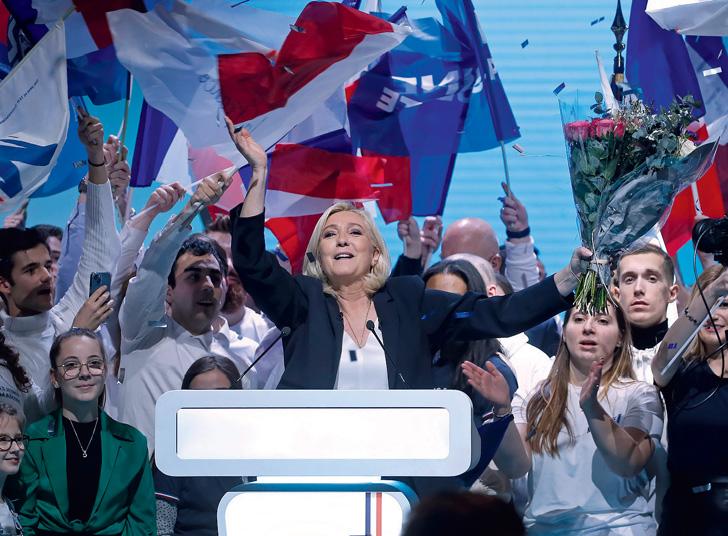
Lunching on a sandwich in the central market of Volendam, a port north of Amsterdam, Gerald, 24, was lucid about his choice in last month's Dutch election.
"I voted for Wilders, and many of my friends did too," he said. "I don't want to live with my parents forever. I want my own home, and to be able to provide for my family later on. Wilders wants to figure out the housing crisis and make our healthcare better. Those are the most important topics for me."
If everyone who voted in the election were aged under 35, Geert Wilders, the far-right populist whose Party for Freedom (PVV) shocked Europe by winning the most parliamentary seats, would have won even more.
In last year's French presidential runoff, Marine Le Pen won 39% of votes from people aged 18-24 and 49% of those aged 25-34. Before Italy's election in September last year, Giorgia Meloni's Brothers of Italy was the largest party among under-35s, on 22%.
Across Europe, the image of the radical-right voter - typically white, male, non-graduate, and old - is changing, and studies suggest that in several countries, support for the far right is growing fastest among younger voters.
Several factors may explain the phenomenon, analysts say. "We really should be careful about assuming a cultural or ideological alignment between young voters and the far right," said Catherine de Vries, a political scientist at Italy's Bocconi University.
Denne historien er fra December 08, 2023-utgaven av The Guardian Weekly.
Start din 7-dagers gratis prøveperiode på Magzter GOLD for å få tilgang til tusenvis av utvalgte premiumhistorier og 9000+ magasiner og aviser.
Allerede abonnent ? Logg på
Denne historien er fra December 08, 2023-utgaven av The Guardian Weekly.
Start din 7-dagers gratis prøveperiode på Magzter GOLD for å få tilgang til tusenvis av utvalgte premiumhistorier og 9000+ magasiner og aviser.
Allerede abonnent? Logg på

Cutting a dash
Scissor Sisters are reuniting to celebrate 20 years since their debut album. They talk fans, Elton John and connecting with the UK's weird’ energy

How art led resistance to Pakistan's dictatorship
A dazzling exhibitionin Qatar reveals how the repressive regime of Zia-ul-Hag led prompted a powerfulcreative defiance

The death of the middleclass professional spells danger for Labour
What does it mean to have a middle-class, white-collar professional job?

I love travelling Europe by train, but a joined-up approach is needed
Last August, I took the train from Trieste to Ljubljana, following a route once used by the Orient Express.

How will 2025 turn out? The life of Jimmy Carter offers us a clue Jonathan Freedland
How will we look back on 2025? Or, if that seems too absurd a question to ponder just a few days into the new year, how might we view the first quarter of the 21st century? As it happens, the answer to both questions is the same and it was confirmed by an event that came as the old year faded and the new one began.

15 ways to overcome overwhelm
Readers and wellbeing experts share tips on corralling chaos and avoiding anxiety, from journalling to cherishing nature

Overwhelmed? Here's how to fix it
Modern life is exhausting. Here, Guardian writers explain what they have given up to make space in their schedules and lives from social media to makeup to news addiction. Then, readers and experts offer tips on how to navigate the demands and pressures we all face. First, Emine Saner examines why we are so overwhelmed

Seoul standoff Impeached president fights on despite arrest attempt
South Korean anticorruption officials attempting to arrest the country's suspended president, Yoon Suk Yeol, must know by now what he meant by his repeated vows to \"fight to the end\".

'Don't feed the troll': European leaders hit back at Musk
When the German chancellor, Olaf Scholz, was asked in an interview about the barrage of insults being directed at him and other German leaders by Elon Musk, the world's richest man, his reply was: \"Don't feed the troll.\"

History lessons The two steps that could stop societal collapse
Academic Danilo Brozović says studies of failed civilisations all point in one direction-the need for radical transformation to survive